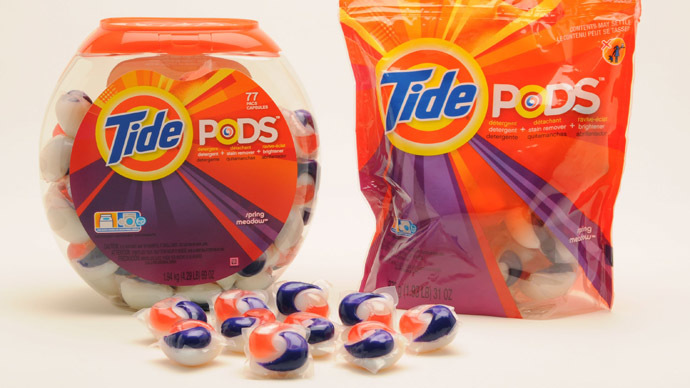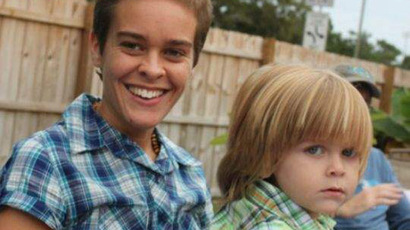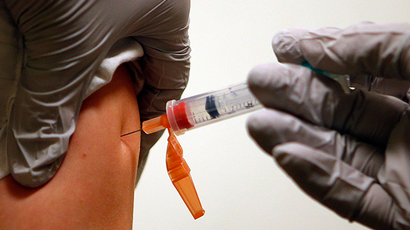Comas & seizures: 100s of kids hospitalized after mistaking cleaning products for candy

Laundry detergent pods are causing US health officials a major headache. The country’s poison control centers received around one call an hour between 2012 and 2013 after kids had been exposed to the dangerous chemicals, mistaking them for candy.
The centers received 17,230 calls concerning children younger than six who had come into direct contact with the chemicals inside the pod packets. The vast majority of the kids were not seriously harmed, but over 700 kids required hospitalization. There was one fatality, while 144 suffered eye injuries, 30 went into comas and 12 experienced seizures.
The products were first introduced to the US market in 2012 and certainly made homemakers’ lives easier as they removed the need to add separate detergent. The packets dissolve in the wash, however their bright packaging also caught the attention of young children, who occasionally mistake them for candy or a toy.
Does this look like a piece of candy? It does to some kids. Keep detergent pods away from little ones! pic.twitter.com/smf95YwyZV
— Lindsey Mastis (@LindseyMastis) November 10, 2014
The research was led by Dr. Gary Smith, director of the Center for Injury Research and Policy at Nationwide Children’s Hospital in Columbus, Ohio.
“This is an age group that has newfound mobility,” Smith said, when commenting on why so many kids had taken an interest in the pods. “They’re curious and they don’t sense danger. Children may think the colorful pods are candy or filled with juice,” he added, Reuters reports.
The American Association of Poison Control Centers (AAPCC) has recorded a total of 25,653 cases of exposure to the products since 2012, when data was first recorded, to the end of September 2014. A third of the cases involved kids under the age of three, while 80 percent of the calls involved children swallowing the pods.
“This caught us by surprise. I’ve seen these cases come through the hospital’s emergency department. I was aware of the case reports, but I haven’t seen anyone pull together the numbers,” Smith added.
Meanwhile, Dr. Michael Gray, from the Abrahamson Pediatric Eye Institute at Cincinnati Children’s Hospital, who did not take part in the report, says eye problems are also a common consequence of the pods.
“They saw well over 100 corneal abrasions. . . . Certainly this is a nationwide problem. A corneal abrasion is basically a scratch on the cornea,” he said.
Hundreds of kids injured, poisoned by laundry detergent packets, says study http://t.co/07o1FNAqRjpic.twitter.com/Z2gQeNqKSe
— WPTV (@WPTV) November 10, 2014
Jessica Morin from Houston told AP her nine-month-old daughter Marlow was made sick earlier this year her grandmother mistook a detergent pod for a teething toy and put it in the baby's mouth.
"I called poison control and they said to take her to the ER immediately," Morin said. The baby suffered from repeated vomiting. However the sickness began to subside and the doctors said Marlow had not suffered any serious damage and was not kept in hospital overnight.
The AAPCC has issued guidelines on its website to try and warn adults with children to be aware of the dangers of that the pods can pose.
Kids can mistake laundry detergent pods for candy http://t.co/sfoCNsxY44pic.twitter.com/UnaAaa7t8p
— Sinpetru Laura (@SinpetruLaura) November 10, 2014
The American Cleaning Institute says it is also working with manufacturers to educate parents about the potential dangers of the packets towards their children. But a survey the group released last week suggests many consumers still don't know about the risks.
Smith also believes there is a lack of information warning of the dangers.
“These are continuing examples of a systemic problem we have in this country,” he said. “It’s that our products are designed by adults for the use and convenience of adults.”














